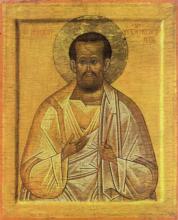8/21 July
 Saint Procopius was a German of the Roman Catholic confession, a foreign merchant who traded in Novgorod. Captivated by the beauty of the Orthodox Divine service, he accepted Orthodoxy, distributed his wealth to the needy and entered the monastery of Venerable Varlaam of Khutinsk near Novgorod as a monk. After some time, fleeing notoriety, he withdrew to the city of Ustiug. Here he chose the difficult ascesis of foolishness for Christ's sake, that is, he pretended to be crazy, in order to acquire perfect humility. Thus, he became the first holy fool in Rus'. He had to endure many afflictions in carrying out his difficult ascesis. With three wooden staffs in his hands, he would walk without shoes and in poor clothing in summer and winter. Accepting alms from the compassionate, he would never take anything from rich men who made their fortune by unrighteousness, even if he was hungry and had remained without any food for several days.
Saint Procopius was a German of the Roman Catholic confession, a foreign merchant who traded in Novgorod. Captivated by the beauty of the Orthodox Divine service, he accepted Orthodoxy, distributed his wealth to the needy and entered the monastery of Venerable Varlaam of Khutinsk near Novgorod as a monk. After some time, fleeing notoriety, he withdrew to the city of Ustiug. Here he chose the difficult ascesis of foolishness for Christ's sake, that is, he pretended to be crazy, in order to acquire perfect humility. Thus, he became the first holy fool in Rus'. He had to endure many afflictions in carrying out his difficult ascesis. With three wooden staffs in his hands, he would walk without shoes and in poor clothing in summer and winter. Accepting alms from the compassionate, he would never take anything from rich men who made their fortune by unrighteousness, even if he was hungry and had remained without any food for several days.
Once, during a time of cruel frost, when the birds froze in flight, the blessed one sought refuge. They did not receive him into their homes. Even the dogs, near whom he wanted to warm himself, ran away from him. Procopius began to freeze. Suddenly, there came a breath of unearthly warmth, and an angel touched his face. From this, the blessed one got warm and gained strength. The blessed one told Simeon, a cleric of the cathedral church, of this miracle and asked him not to divulge it before his decease.
For his ascetic struggles, the blessed one was deemed worthy of the gift of clairvoyance. Once he bowed down before a three year old girl and said to her parents: "Here is the mother of a great saint". She became the mother of Hierarch Stephen of Perm. In the year 1290, the blessed one, in the course of a week, went about the city calling the inhabitants to repent and pray that the Lord would deliver the city from the lot of Sodom and Gomorrah (Genesis, Chapter 19). No one believed him. All of a sudden an ominous cloud appeared in the sky. It grew and grew, so that the day was turned into night. Lightning flashed and thunder rolled, shaking the walls of buildings, so that human voices could not be heard. A foreboding of destruction came on. The inhabitants rushed to the cathedral church, where the blessed one was already praying before the icon of the Annunciation of the Theotokos. Before everyone's eyes, a miracle occurred: On the icon, myrrh began to flow, as a sign of the mercifulkindness of the Mother of God performed over the city. A fragrance filled the church. Myrrh from the wonderworking icon flowed to such an extent that the church vessels were filled with it. Those anointed with it received healing from various illnesses. After this, the stifling air became fresh and the sun peeped out. Twenty versts [13.25 miles] from Ustiug, at the Kotoval dale, the clouds burst forth with hail and lightening. Hail broke the ageold forest to pieces, not bringing harm, however, either to man or beast. In memory of the city's deliverance from destruction, the celebration of the Ustiug Icon of the Mother of God was instituted.
In conversation with pious people, his every word and action were an instruction and forewarning. The righteous Procopius died in deep old age in the year 1303 at the gates of the Archangel Monastery. Many miracles were performed over his grave. The appearances of the Godpleaser are also recorded.
